10+ Powerful AI Optimization Techniques to Dominate Search
Mar 30, 2025
10+ Powerful AI Optimization Techniques to Dominate Search

As businesses increasingly rely on SaaS to meet customer demands, optimizing digital content to rank highly on search engine results pages has never been more critical. But let’s face it: the world of SEO can be daunting. Between constant algorithm changes, increasing competition, and the need to create high-quality content that appeals to search engines and human readers, it’s easy to feel overwhelmed. Fortunately, AI optimization can help. In this article, we’ll explore how AI-driven optimization techniques can help you rank at the top of search results, so you can increase organic traffic and improve SaaS demand generation with minimal effort.
Rank #1 on Google and AI search and boost your SEO with Trailblazer Marketing’s AI-powered solution. The software will help you achieve your objectives, like leveraging AI-driven optimization techniques to improve your top search rankings, increase organic traffic, and stay ahead of competitors with minimal effort.
Table of Contents
What is the Impact of AI on SEO?

AI is transforming SEO in many ways, making leveraging the channel challenging for marketers. The SEO industry generated $68.1 billion globally in 2022 and is expected to reach $129.6 billion by 2030. These projections were made before the arrival of generative AI, which could put the industry at risk of obsolescence or cause significant disruption.
“Gartner predicts that by 2026 traditional search traffic will drop by 25%. People are behaving differently when they search any type of query on a search engine, but they're also utilizing more platforms in their searches. Social search has become a big thing and people are utilizing TikTok, Instagram, YouTube for more of their searches,” said Luke O’Leary in our 2025 trends webinar.
Search engines prioritize search intent to understand better what consumers or searchers want to provide the perfect answer. Google's result is its AI Overviews. For some queries, Google now uses generative AI in over 20% of its search results through AI Overviews.
AI Overviews and the Rise of Content-Driven SEO
Research by SEOClarity found that over 96% of AI Overviews appear for queries with informational user intent compared to just 1.2% for transactional queries. This means sites that provide information like blogs must be AI-SEO optimized. This example of an AI Overview result shows what comes up in response to ‘stats on social media’.
Google has also extended its use of AI to include sponsored results in AI Overviews. For example, their AI Overviews Ads announcement provided an example: for the query "how do I get a grass stain out of jeans?", where the searcher saw an ad for stain removers.
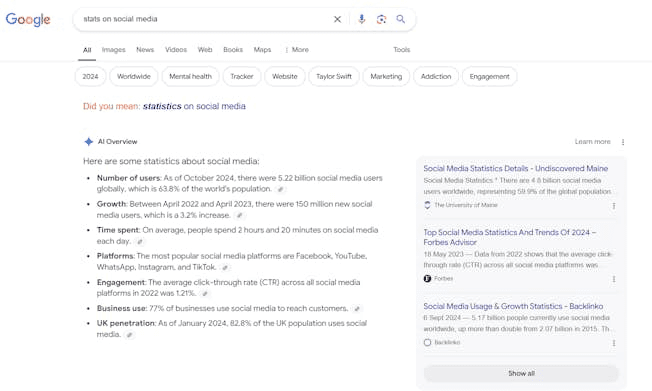
Here are the main areas of AI impact on SEO you should be aware of:
AI-Powered Algorithms Are the New Norm
Algorithms like Google's RankBrain use AI to enhance search result accuracy and personalization, using machine learning to determine user intent. To rank highly, content must be:
Relevant
User-focused
Conversational
AI Is Changing the Game for Content Creation and Optimization
AI tools such as ChatGPT, Claude, and Jasper make it easy for companies to generate content quickly. Nevertheless, human intervention is always recommended to ensure the content is accurate, relevant, and unique. Google has said that AI-generated content won’t impact search rankings; instead, it is focused on the quality of content. To leverage this, marketers should focus on E-E-A-T-friendly content to rank.
Keywords Are Now Just a Small Piece of the Puzzle
Finding the right keywords or key phrases is central to SEO. Nonetheless, AI is focused on the context and intent behind search queries, making keywords less relevant in searches. This requires keywords to be part of a broad SEO strategy rather than the main focus and to be integrated into relevant and informative content.
Trailblazer Marketing serves as your dedicated SEO team, driving profitable growth through strategic content that ranks prominently in both Google and Bing and AI search platforms like:
ChatGPT
Claude
Perplexity
Rapid Growth & Revenue
Our scientific approach has delivered extraordinary results across industries. It helps companies rank number 1 in Google and AI search, including a B2C SaaS client with a 3,518% increase in non-branded traffic within 21 days. Ultimately, this client generated 2.1M organic clicks and over $700,000 in first-year revenue—far exceeding their $300,000 ARR goal.
Our Winning Methodology
Similar success stories include a B2B SaaS client achieving 9,644% traffic growth within 10 months and a mobile app seeing 65 %+ increase in downloads within 50 days. Our comprehensive methodology sets us apart:
Long-term planning
Product-led keyword research
Competitive analysis
Strategic backlink building
High-velocity content production
Test Before You Invest
Most SEO agencies require thousands per month upfront. Still, our $300 Validate Program lets you test our process with 10 SEO-optimized articles and see actual results within 30 days before committing to a more significant investment. We only have three spots available monthly; reserve yours today.
Related Reading
6 AI Optimization Hacks to Skyrocket Your SEO Performance

1. Prioritize Long-tail Keywords
As search evolves, traditional keyword research and selection are shifting. Instead of focusing only on high volume, high competition “head” terms, brands should prioritize long-tail keywords that align with conversational queries and natural language processing.
The Long-Tail Advantage
AI search models often favor these more specific and intent-driven queries over head terms, and users are increasingly searching with complete questions or complex phrases rather than short keywords. Also, long-tail keywords are typically less competitive than head terms, making ranking for the average site easier.
Embracing Low-Volume Keywords
According to Google, 15% of all Google searches have never been searched before, so there is demand for fresh, niche content optimized for new and potentially growing search trends. How to adapt Go low: Stop filtering out keywords with low search volumes. Gone are the days when you automatically filter out keywords because they don’t meet your arbitrary minimums.
You need to map more terms with lower monthly searches than you may have historically. Be conversational: Spend time identifying conversational queries from places like Google’s People Also Ask, tools like AnswerThePublic, and discussions on forums like Reddit.
Building Authority with Answer-Focused Content
If you want to be an authority on a topic online, you will want to help answer as many of the long-tail questions people have about it as possible.
Use variations: Optimize your content for semantic search by using related phrases, synonyms, and natural language variations.
Use FAQs: Create helpful FAQ sections within your content where you can add actual questions and capture multiple long-tail queries in a structured format. For example, Kiehl’s content above is helping their domain achieve over 550 AI Overview rankings.
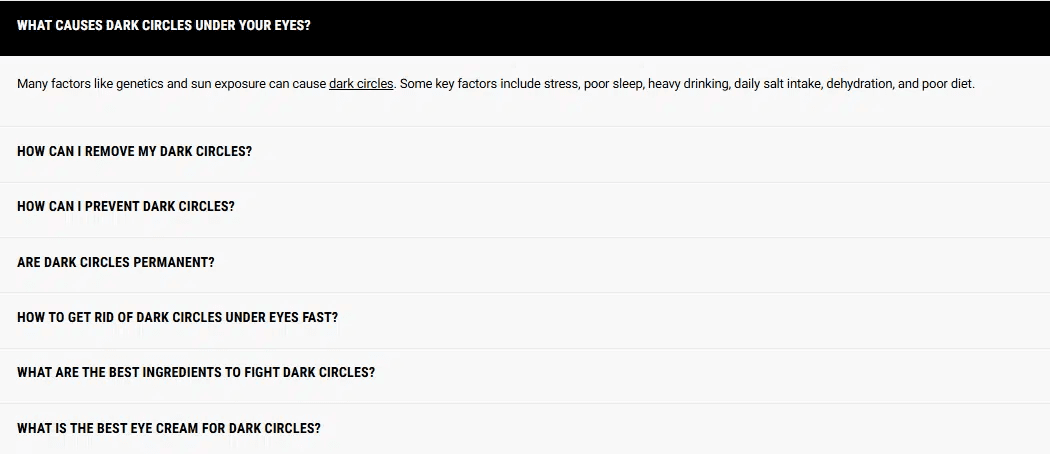
2. Improve Content Clarity and Structure
AI models extract concise and structured information from content. Your content should be organized, skimmable, and summarized to enhance visibility in AI search (and to improve your user experience, because people want things faster than ever).
How to Adapt
Adjust Your Process
Include key takeaways at the top of content, write clear and concise summaries for main sections, and ensure I am breaking up text with proper heading structures (e.g. H1, H2s, H3s).
TOC
Use tables of contents for longer content, and a bonus if you use jump links to improve the user experience.
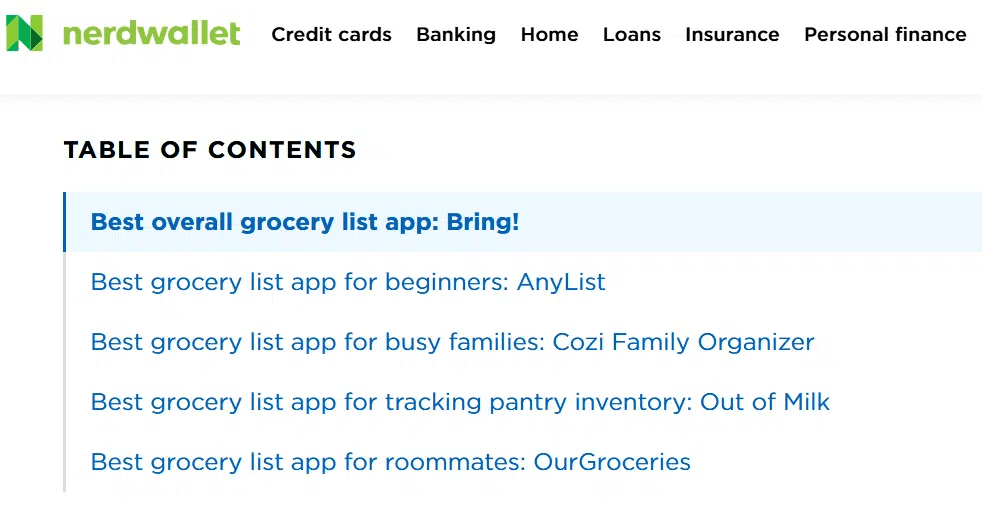
Refresh Existing Content
In addition to updating my content structures going forward, I suggest getting a paid ChatGPT or Claude account and leveraging AI support to refresh your existing content. It doesn’t take new content creation to improve your SEO and AI visibility. Adding key takeaways and enhancing the structure of content I’ve already invested in can go a long way.
Tweaking your existing process with these tips can go a long way in getting your content referenced in AI answers. Our agency has seen that reformatting content in these ways gets our clients cited in AI Overviews in as little as 24 hours after implementation in some cases.
3. Present Balanced Perspectives
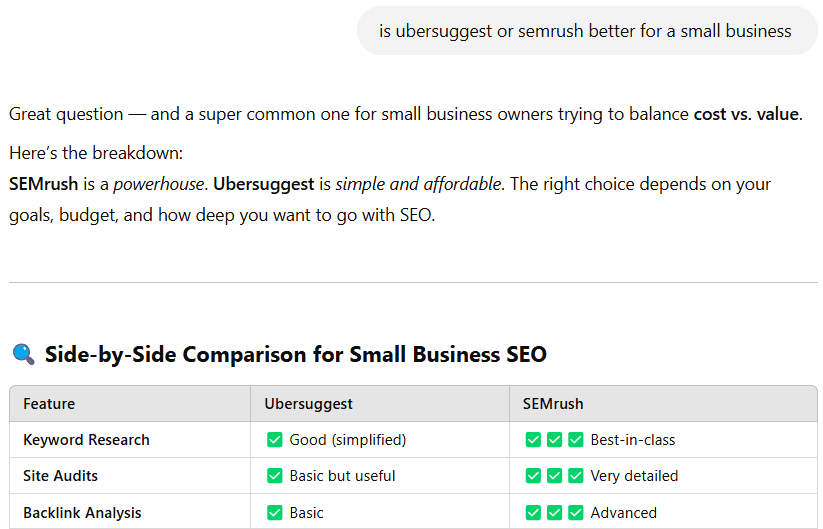
AI models are trained on massive data sets designed to avoid bias, weigh various viewpoints, and present balanced, easy-to-digest summaries. This is especially true when users seek specific recommendations or make comparisons.
If you frequent ChatGPT, you’ve probably noticed answers often summarize pros and cons. This means that balanced and unbiased content is more likely to get cited.
How to Adapt Pros and Cons
Clearly state pros and cons, strengths and weaknesses, or benefits and drawbacks within content.
Tables: If I’m comparing things, consider adding a summary table, which is great for users and AI extraction.
Comparative Language: Use less absolute wording and more comparative language, as AI prefers neutral and nuanced language over definitive opinions. Where it makes sense, use phrases like “best for” or “more ideal when” instead of speaking in absolutes.
Counterarguments: Address potential concerns and provide a more comprehensive point of view in my content by adding sections such as:
Things to Consider
When It’s Not Worth It
Before You Go
Others
4. Strengthen Technical SEO
AI models don’t crawl my site in real time like traditional search engine crawlers. Still, they do rely, in part, on well-structured, semantically rich content to interpret and represent my site’s information accurately. So, while content quality and optimization matter, technical SEO forms the foundation that determines whether my content is accessible and interpretable.
“Now is a good time to double down on technical SEO,” according to Kai Blum, Global SEO Lead at Mailchimp. “I strongly believe that sites that are easily crawlable and pages that load fast perform better in AI Search. Besides, improving the user experience by increasing page speed is always a good investment. And getting your Schema markup in order across the entire site almost goes without saying.”
How to Adapt LLMS.txt
Before I start thinking of an llms.txt as a robots.txt but for AI, know I am a potential opportunity for site owners to surface content and information that is otherwise not directly available via traditional crawling e.g. product data feeds, inventory APIs if they are configured, general APIs, support and customer service content, software developer documentation, etc.
Schema Markup
Schema markup provides explicit signals about the meaning of my content, making it easier for AI search tools to surface accurate and relevant information from my site.
Implement article
FAQ
How-to
Products
Review
Event
Speakable
Breadcrumb
Local business schema
Automate where possible, using CMS plugins or structured data generators to scale schema deployment. If this isn’t already part of your process, build schema markup into your standard content delivery process while you work on an audit across your existing content.
Crawlability and Indexation
Users, search engines, and LLMs alike cannot digest my content if they cannot find/access it. Focus on logical site architecture and a strong internal linking structure, minimize unnecessary redirects, maintain your robots.txt file correctly, and ensure you have fast-loading pages.
JavaScript
While traditional search engines like Google have evolved to render JavaScript when crawling websites, many AI crawlers, including OpenAI’s GPTBot and Anthropic’s ClaudeBot, do not execute JavaScript. Ensure important content is server-rendered or visible in the raw HTML, not just loaded via JavaScript.
Speed and simplicity are critical: Many AI systems have tight timeouts (1-5 seconds) for retrieving content. Assume long content may be truncated or dropped entirely after the timeout.
Clean, structured text wins: Many AI crawlers don’t handle JavaScript well, if at all. Logical content structure in plain HTML or Markdown is ideal.
Metadata and semantics matter: Clear titles, descriptions, dates, and schema.org markup help AI systems quickly understand my content. Blocking crawlers can make me invisible, and in a world of AI agents, overly aggressive bot protection can cut me off entirely.
Differentiate AI training vs. AI search access. Some AI crawlers collect training data, while others retrieve real-time content. I may want different policies for each.
Check my content’s AI visibility. For an AI search engine test, paste a URL into andisearch.com. If options like Summarize or Explain appear, my page will be accessible and valuable to AI.
AI agent test: Use Firecrawl to see how AI agents perceive and access my content.
5. Be Data-Driven
AI models are trained to prioritize authoritative and credible information. With the right data-driven approach, I can increase the credibility of my content and make it more attractive for AI citations.
Also, in a world where it’s getting increasingly complex to tell what’s machine-created, what’s regurgitated, and what’s truly unique, leveraging proprietary data within my content helps me stand apart from the crowd and makes my content easier to pitch to the media.
Beyond Optimization
“The future belongs to authentic voices who bring unique perspectives,” said the AI educator and consultant Britney Muller. “In a world where AI can generate endless generic content, being memorably human becomes my biggest competitive advantage. Focus on being genuinely quotable rather than technically optimized. This isn’t just another shift in search; it’s a return to what matters: saying something worth repeating.”
How to Adapt
Use Proprietary Data
When possible, leverage proprietary data, tailored data collection (e.g. surveys), case studies, or other research to create unique data sets for my content. This makes my content stand out, offering something valuable and unique in a world riddled with low-quality, regurgitated content.
Cite Sources
Reference credible, authoritative sources and up-to-date content. When citing external sources, link directly to the original data and mention it within my content. If I use AI to scale my content, I run everything through a plagiarism checker.
6. Measure and Monitor
If I’m going to put effort into impacting my AI visibility, then I most certainly want to put some effort into measuring the impact and monitoring over time. And if I’m looking to build a business case for an AI optimization budget or resources, this will be crucial. Consider what my leadership team or client will need to see to get on board. Even if I cannot make the case for budget immediately, having the reporting structure in place will be helpful.
“We encourage organizations to focus on what can be concretely measured — AI crawler and agent visits, referral traffic from AI search platforms like ChatGPT, Perplexity, and others, and citations in AI-generated answers,” said Chris Andrew, CEO & Co-Founder of Scrunch AI.
“Across our customers, we’ve consistently seen that traffic from AI search is not just growing — it’s also the highest-converting source of inbound traffic. The brands that track these signals now will have a massive edge as AI-native discovery becomes the norm.”
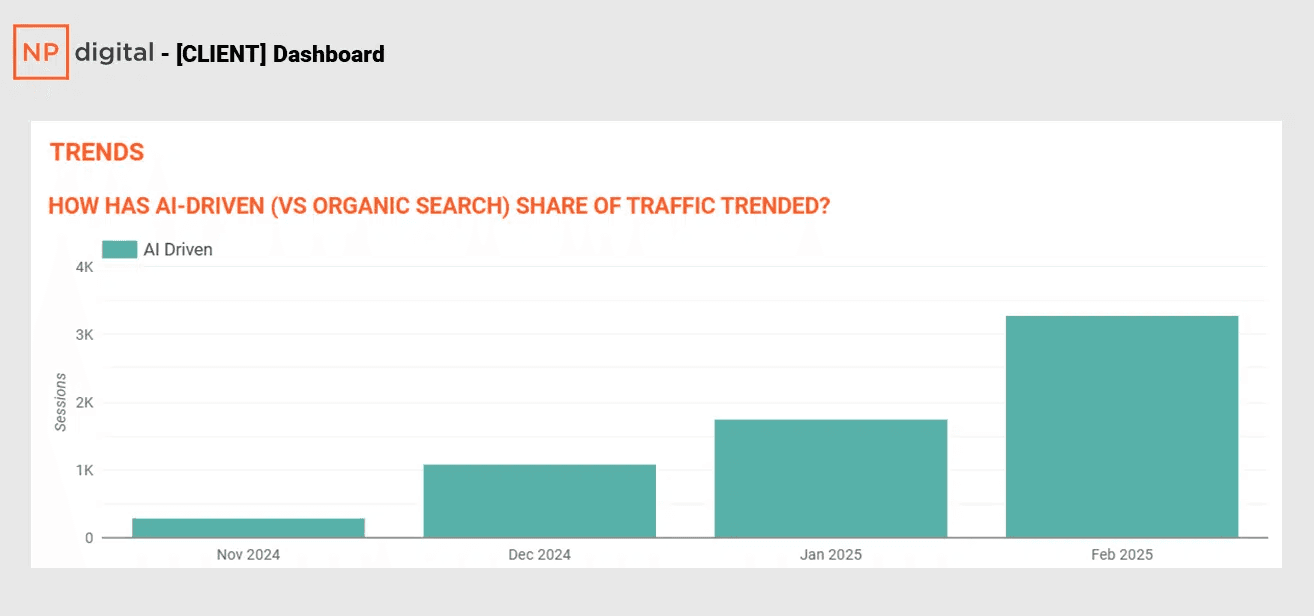
How to Adapt
Dashboard: I need to set up or update my existing SEO dashboard to track metrics like LLM referral traffic and the top LLM referral traffic source.
Organic Search: LLM traffic ratios and LLM referral conversions. AI Overviews: I will use an SEO tool like Semrush to track my vs. the competitor's AI overview presence over time.
Tools: Consider budgeting for Scrunch AI or the Semrush AI toolkit to monitor LLM visibility across ChatGPT, Gemini, Perplexity, and other AI platforms.
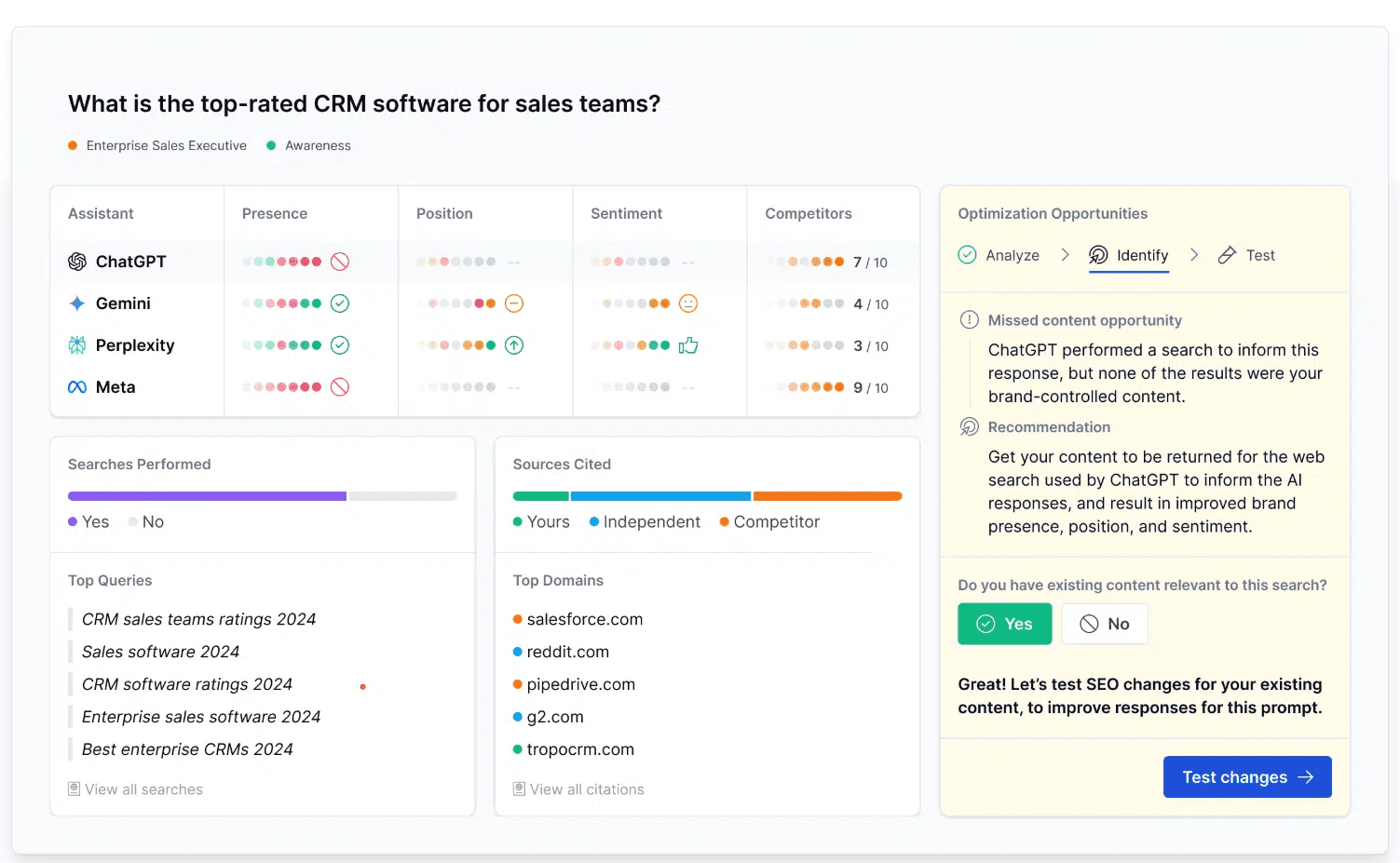
There are many AI visibility platform options now, so I recommend setting up a demo with at least a couple to weigh the different features, costs, and values.
Trailblazer Marketing serves as your dedicated SEO team, driving profitable growth through strategic content that ranks prominently in both Google and Bing and AI search platforms like:
ChatGPT
Claude
Perplexity
Our scientific approach has delivered extraordinary results across industries. It helps companies rank number 1 in Google and AI search, including a B2C SaaS client with a 3,518% increase in non-branded traffic within 21 days. Ultimately, this client generated 2.1M organic clicks and over $700,000 in first-year revenue, far exceeding their $300,000 ARR goal.
Similar success stories include a B2B SaaS client achieving 9,644% traffic growth within 10 months and a mobile app seeing a 65 %+ increase in downloads within 50 days. Our comprehensive methodology sets us apart:
Long-term planning
Product-led keyword research
Competitive analysis
Strategic backlink building
High-velocity content production
$300 Trial: Real Results, Low Risk
Most SEO agencies require thousands per month upfront. Still, our $300 Validate Program lets you test our process with 10 SEO-optimized articles and see actual results within 30 days before committing to a more significant investment. We only have three spots available monthly; reserve yours today.
Related Reading
Advanced Tactics to Bolster AI Visibility

When generating responses, search engines factor in online mentions, citations, and brand authority. A strong digital PR strategy helps you become a trusted source in the new AI search space.
“Beyond the more effortless tactics like optimizing for long-tail keywords and using clear formats that AI can parse, the real winners will be those who understand that your digital footprint is now measured by who’s talking about you across the web. Getting mentioned in semantically similar conversations increases your probability of showing up in AI overviews,” Muller said.
“While everyone is obsessing over technical AI optimization, they’re missing the fundamental shift: brand mentions are becoming the new backlinks. Google counts links, but AI counts conversations.”
Create and Optimize a Wikipedia Page for Your Brand
Wikipedia plays a critical role in the digital information ecosystem. It’s one of the most commonly used sources for training AI models, helping them verify facts, define entities, and assess credibility.
A well-crafted, properly sourced Wikipedia page can significantly enhance your brand’s online authority and increase the likelihood of being referenced in AI-generated content, including:
Search engine answers
Virtual assistants
Wikipedia: Building Digital Authority
Creating and maintaining a Wikipedia page is no small task. The platform enforces strict notability and sourcing guidelines, and content must be written in a neutral, encyclopedic tone. Success requires strong third-party coverage from reputable publications, thoughtful page structure, and ongoing updates to ensure accuracy and relevance. Despite the upfront effort, a Wikipedia presence is a valuable long-term asset for:
Brand visibility
Trust
Authority
Key Optimizations for AI Accessibility
Configure Robots.txt for AI Crawlers
Add a robots.txt with fairly open access. Allow or disallow crawlers on a case-by-case basis. Here’s an example that allows access for AI search/agents but disallows training data collection:
Allow AI Search and Agent Use
User-agent: OAI-SearchBot
User-agent: ChatGPT-User
User-agent: PerplexityBot
User-agent: FirecrawlAgent
User-agent: AndiBot
User-agent: ExaBot
User-agent: PhindBot
Directive: Allow: /
Disallow AI Training Data Collection
User-agent: GPTBot
User-agent: CCBot
Disallow: Disallow: /
Allow Traditional Search Indexing
User-agent: Googlebot
User-agent: Bingbot
User-agent: Allow: /
Disallow Access to Admin Areas for All Bots
User-agent:
Directive:
Disallow: /admin/
Disallow: /internal/
Sitemap
Sitemap: [insert your sitemap URL here]
Avoid Overly Aggressive Bot Protection
Don’t use aggressive bot protection on Cloudflare/AWS WAF. This will prevent AI crawlers and agents from accessing your content. Instead, allow major U.S. datacenter IP ranges.
Optimize for Speed
Return content as fast as possible, ideally under one second. Keep key content high up in the HTML. Use clear metadata and semantic markup. Examples include:
Basic SEO tags: <title>, <meta description>, and <meta keywords>
OpenGraph tags: This improves previews in AI search results.
Schema.org markup: Use JSON-LD for structured data.
Proper heading structure: (H1-H6)
Semantic elements: <article>, <section> and <nav>
Single-Page Structure and Data Accessibility
Keep content on a single page where possible
Avoid “Read more” buttons or multi-page articles.
Provide programmatic access via APIs (with OpenAPI specs) or RSS feeds. This allows faster, more structured access to AI tools.
Indicate content freshness
Use visible dates and <meta> tags to help AI understand when content was published or updated.
Create an llms.txt File
Create an llms.txt file for documentation or reference content. Use Firecrawl’s generator. Submit a sitemap.xml to guide crawlers to important content. Use a favicon and lead image. AI search engines display content visually. Having a simple favicon.ico and clear lead images improves visibility.
Major AI Crawler User-Agents
When configuring your robots.txt, consider these significant AI crawlers:
OpenAI GPTBot (training data)
ChatGPT-User (user actions in ChatGPT
OAI-SearchBot (AI search results)
Google Google-Extended (AI training)
GoogleOther (various AI uses)
Anthropic: ClaudeBot (consolidated bot for multiple uses)
Andi: AndiBot
Perplexity: PerplexityBot
You.com: YouBot
Phind: PhindBot
Exa: ExaBot
Firecrawl: FirecrawlAgent
Standard Crawl: CCBot (used by many AI companies for training data)
For a complete, up-to-date list, check Dark Visitors.
Optimizing for AI Agent Computer Use
AI agents that can use computers, like Browser Use or OpenAI’s Operator, are a new frontier. Some tips: Implement “agent-responsive design.” Structure your site so AI can easily interpret and interact with it. Ensure interactive elements like buttons and text fields are clearly defined and accessible.
Frictionless Interaction
Use consistent navigation patterns to help AI predict and understand site flow. Minimize unnecessary interactions like login prompts or pop-ups that can disrupt AI task completion. Incorporate web accessibility features like ARIA labels, which also help AI understand page elements. Regularly test your site with AI agents and iterate based on the results.
Resources for Dev Tools Startups
If you’re building developer tools, optimize for AI visibility: Maintain an up-to-date llms.txt file. Provide easy access to clean HTML or markdown versions of your docs. Consider using documentation tools like Theneo and Mintlify to optimize for AI accessibility.
Validate SEO for $300 - 3 Spots Available per Month | Reserve Your Spot Today
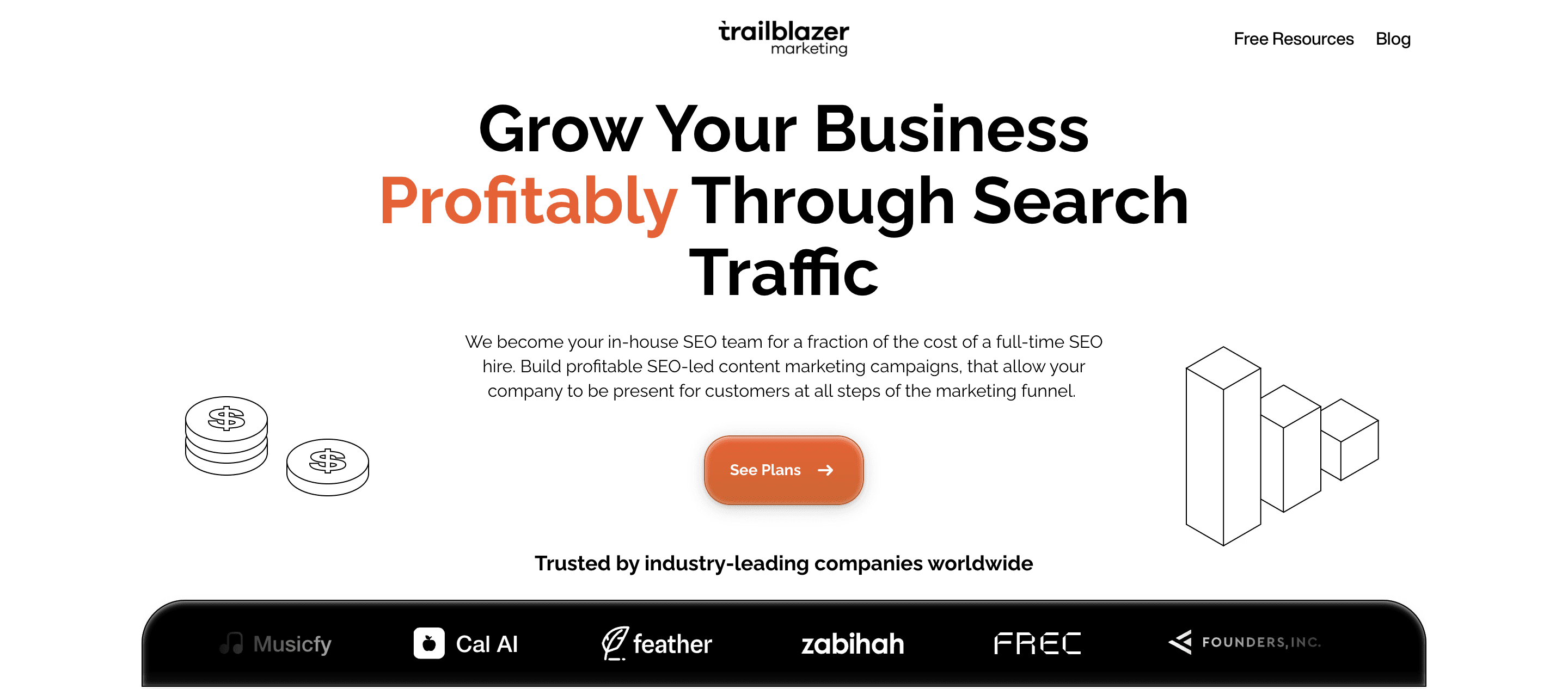
Trailblazer Marketing serves as your dedicated SEO team, driving profitable growth through strategic content that ranks prominently in both Google and Bing, as well as AI search platforms like:
ChatGPT
Claude
Perplexity
Scientific SEO Results
Our scientific approach has delivered extraordinary results across industries. It helps companies rank number 1 in Google and AI search, including a B2C SaaS client with a 3,518% increase in non-branded traffic within 21 days. Ultimately, this client generated 2.1M organic clicks and over $700,000 in first-year revenue—far exceeding their $300,000 ARR goal.
Proven Methodology and Remarkable Growth
Similar success stories include a B2B SaaS client achieving 9,644% traffic growth within 10 months and a mobile app seeing 65%+ increase in downloads within 50 days. Our comprehensive methodology sets us apart:
Long-term planning
Product-led keyword research
Competitive analysis
Strategic backlink building
High-velocity content production
Test Drive SEO: Affordable 30-Day Results
Most SEO agencies require thousands per month upfront. Still, our $300 Validate Program lets you test our process with 10 SEO-optimized articles and see actual results within 30 days before committing to a more significant investment.
We only have 3 spots available monthly; reserve yours today!
AI Optimization is the New Frontier in SEO
AI optimization is quickly becoming a crucial component of effective search engine optimization. With the rapid advancement of AI technologies, search engines use AI to understand content better and deliver more relevant results to users. Optimizing for AI is now a key part of ranking well on search engines.
Driving Organic Growth
A big part of this process involves creating content relevant to users and the AI algorithms. This is precisely what we do at Trailblazer Marketing. By optimizing your website for AI, we can help your business attract the attention of AI algorithms so you can rank higher on search engines and get more organic traffic.
Related Reading
Dec 25, 2025
The ChatGPT App Store is Here.
OpenAI just launched the ChatGPT App Store, opening app submissions and creating a new App Directory for 800M+ weekly users. This blog post explains what the launch means for founders, how the app store changes the LLM SEO landscape, and why becoming discoverable inside ChatGPT is now as critical as ranking on Google. Learn the 2025 strategies to position your brand before this distribution channel becomes saturated.
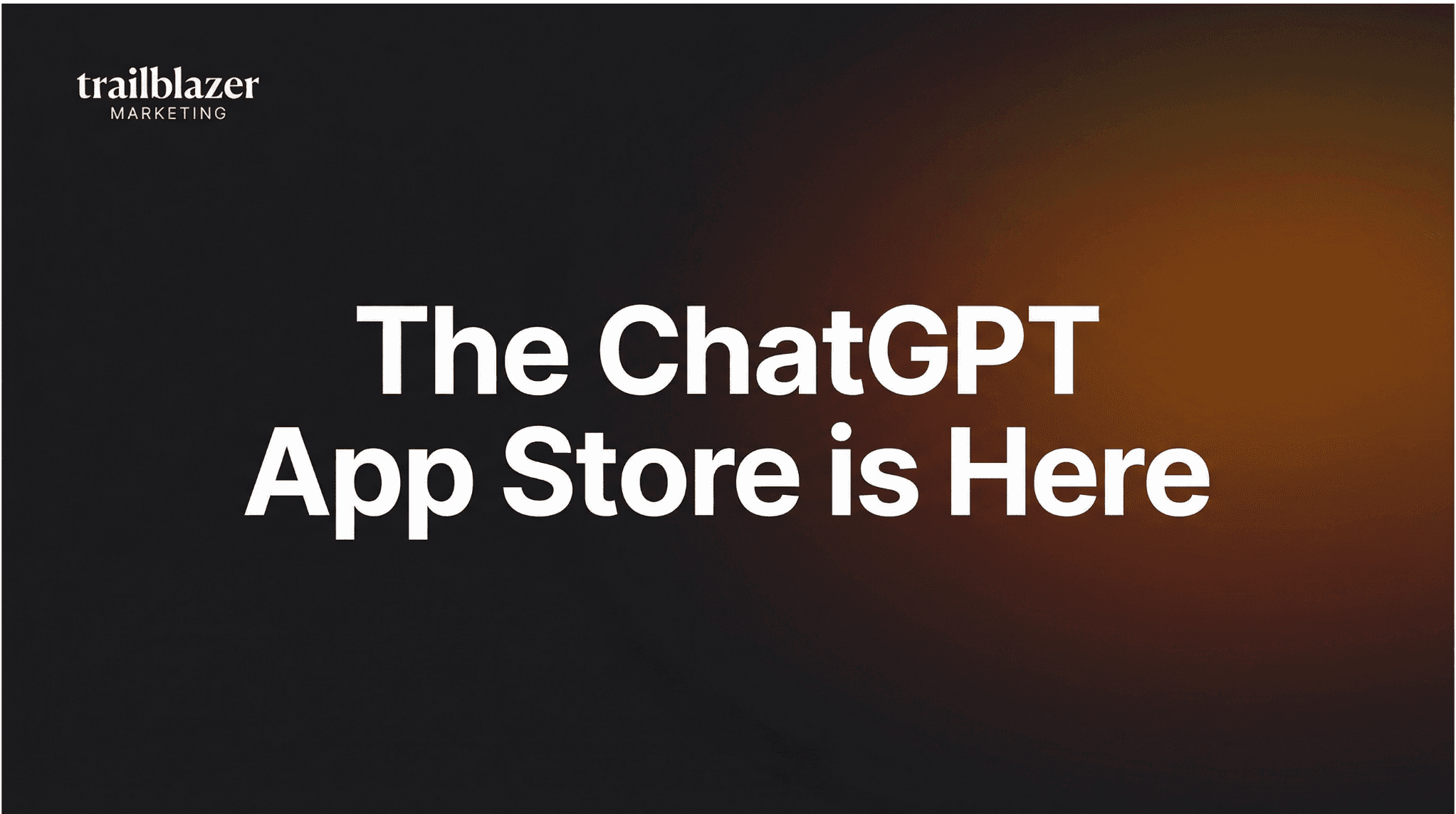
Dec 11, 2025
The 2025 LLM SEO Playbook: 10 Proven Strategies to Dominate AI Search
This playbook synthesizes the most critical learnings for 2025, moving beyond traditional SEO to a more holistic framework.
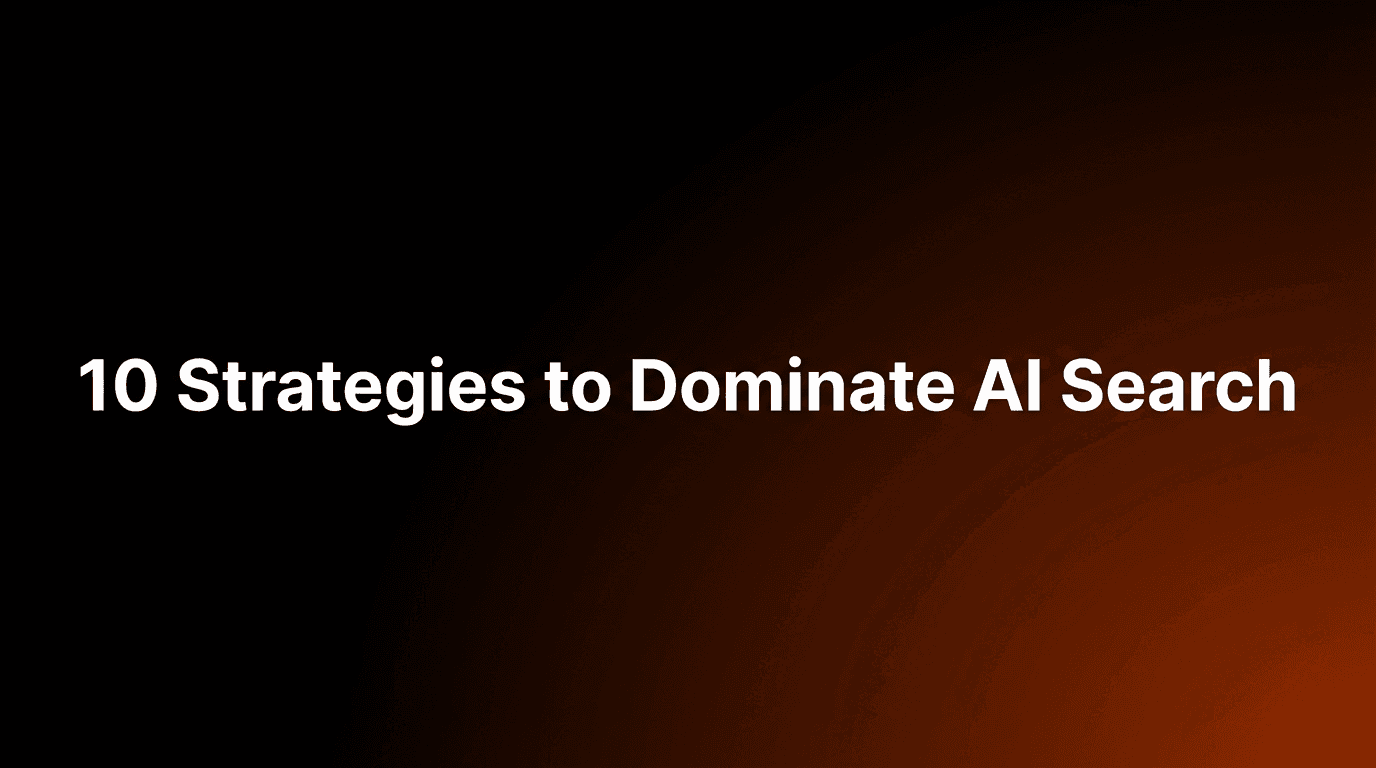
Jul 16, 2025
Why Founders Should Care About LLM SEO (Before Everyone Else Does)
LLM SEO is like Google SEO in the early 2000s. This is the biggest organic growth opportunity at the moment. First movers will lead organic growth for the coming decades.
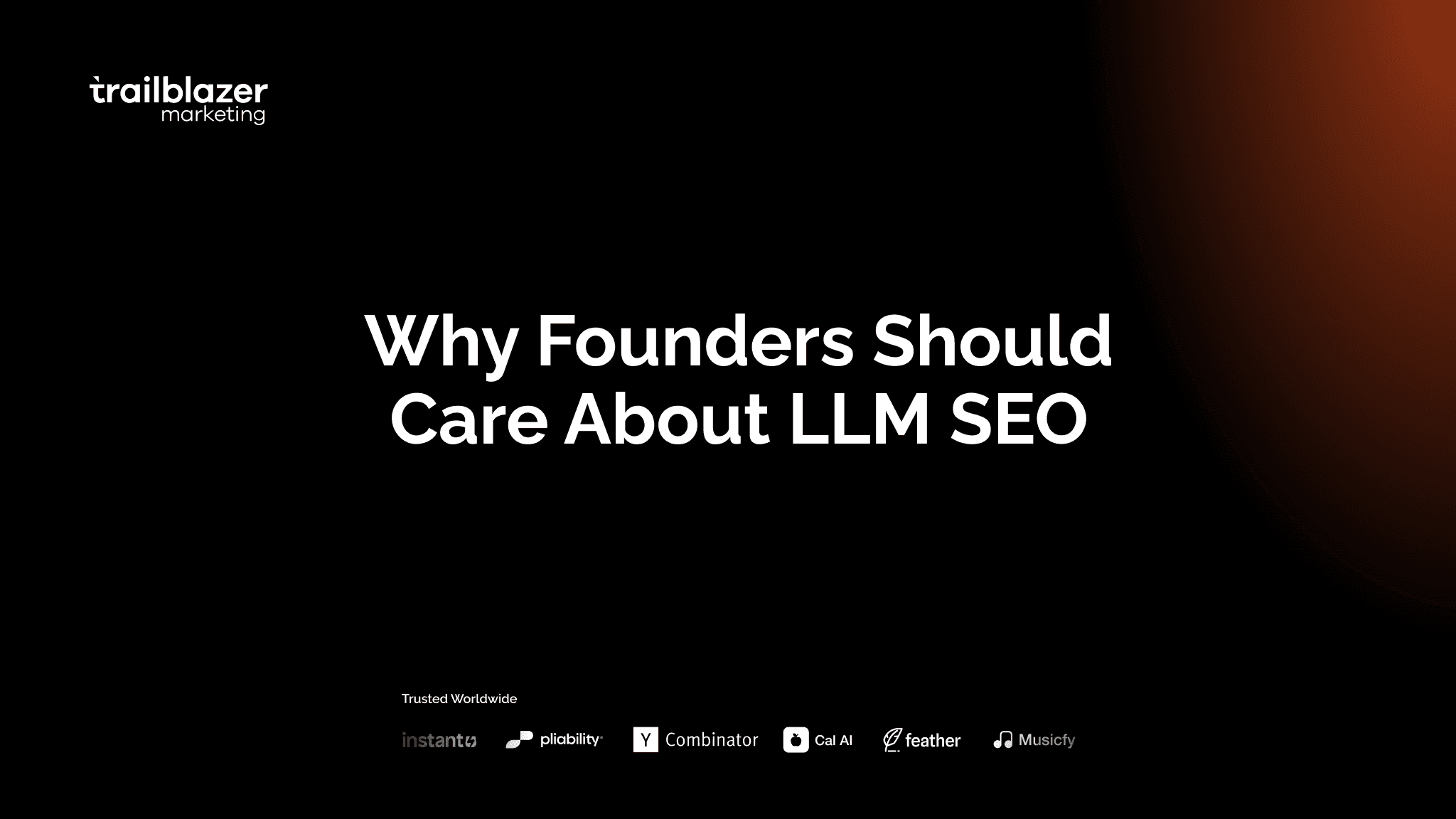
Used to help top companies:






